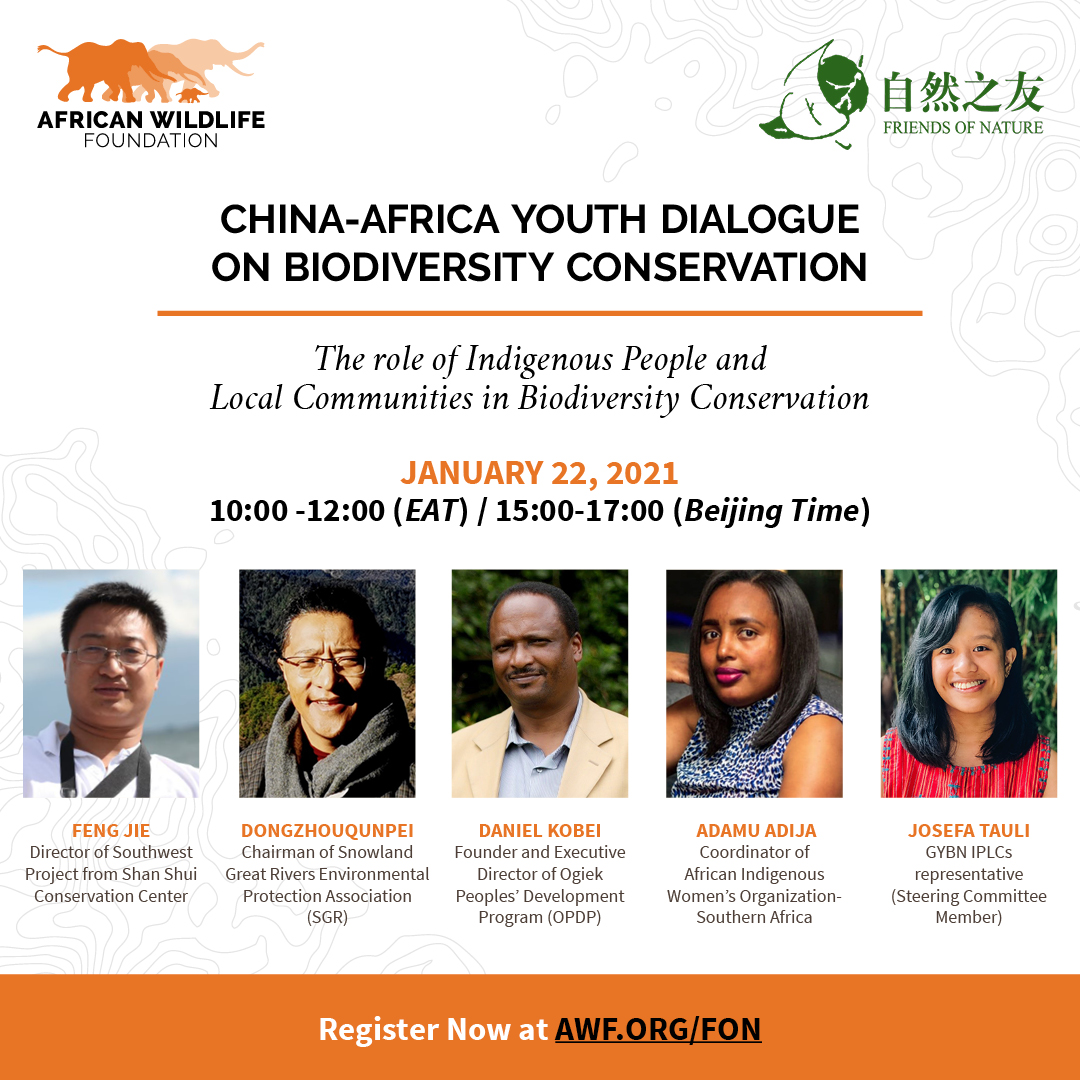AWF and FON Continue Series on China-Africa Youth Dialogues

General Inquiries
Tel:+254 711 063 000
Ngong Road, Karen, P.O. Box 310
00502 Nairobi, Kenya
On January 22, 2021, the African Wildlife Foundation (AWF) in collaboration with the Friends of Nature (FON) organized the third webinar set to convene Chinese and African youth to discuss the integral role the Indigenous People and Local Communities (IPLCs) play in conservation and how best to engage. The virtual dialogue had over 190 participants from various regions around the world who were eager to share their own experiences and recommendations.
These dialogue series have been an extended conversation that is targeted to create a holistic approach towards the implementation of the Post-2020 Global Biodiversity Framework. Mr. Jie Feng, the Director of Southwest Project from Shan Shui Conservation Center took a very innovative approach in his presentation giving a historical account of how conservation has evolved in China from a community self-management system in the 19th century to the current co-management approaches learned from different nations.
“In order for conservation efforts to be impactful, we all need to embrace traditional knowledge and understand the historical trends of landscapes and local traditions that contribute to a healthy ecosystem. In places where culture was not valued in China, nature suffered immensely,” Mr. Feng said.
Over the years, poor governance and weak stewardship rights of indigenous peoples and local communities have significantly undermined local support for conservation and render ineffective attempts to counter biodiversity loss. Moderated by AWF’s newly appointed Senior Youth Program Manager, Ms. Simangele Msweli, the wide array of speakers agreed that the current top-bottom approach is a major hindrance to achieving the ambitious biodiversity targets.
“There has been a growing gap between high-level and local communities attributed to the ongoing top-down conservation model that has propelled biodiversity loss further. We need to change tact and use a bottom-top approach to see high-impact results,” Adamu Adija, Coordinator of African Indigenous Women’s Organization-Southern Africa, proposed.
Modernization has brought non-conventional biodiversity problems in rural regions. Mr. DongZhouQunpei, the Chairman of Snowland Great Rivers Environmental Protection Association (SGR) shared a clear example of how waste management of non-degradable packaging not ingrained in most belief systems and cultures of Indigenous People.
“Indigenous Peoples see biodiversity as part of who they are and what they do in all aspects of their livelihood. However, the main challenge is the disrespect of their land and territorial rights as a result of being sidelined in decisions involving management plans both by government and corporations within their regions,” said Daniel Kobei, Founder and Executive Director of Ogiek Peoples’ Development Program (OPDP).
The effectiveness of high-level conferences was put in question on whether they necessarily work to the benefit of IPLCs. The Convention on Biological Diversity (CBD) is one that has aimed at addressing this issue from a policy perspective by recognizing the importance of traditional knowledge and sustainable use both in the preamble and Article 8(j) of the convention. In addition to this, the CBD has facilitated the formation of a working group that was formed specifically to ensure the implementation of the latter.
“The International Indigenous Forum on Biodiversity (IIFB) was formed as a way for IPLCs to plug into the convention in a more coordinated way. They have developed guidelines and tools for IPLCs and stakeholders that engage with them highlighting key impact assessment strategies. They also led in the formation of a plan of action on customary sustainable use which is at the center of current CBD negotiations.” Josefa Tauli, GYBN IPLCs Representative and Steering Committee Member emphasized.
The young participants were actively engaged in the dialogue chatbox with new ideas and potential interventions that they want to explore and discuss in upcoming dialogues. They requested the formation of a platform to continue the interactions and AWF and FON committed to being the bridge that will connect this pool of young conservationists from Africa, China, and beyond.